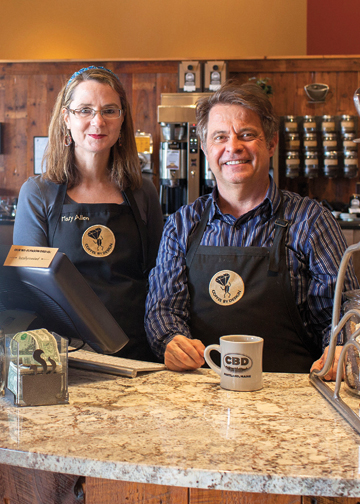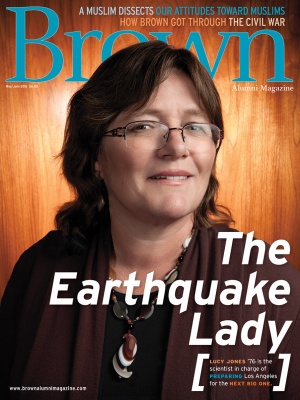Growing up, Mary Allen Lindemann ’82 was part of the soft drink generation. “We drank Tab and Fresca,” she says. “Coffee culture was not something I was aware of.”

All that had changed by 1994, when she and her future husband, Alan Spear, opened a specialty coffee shop, Coffee By Design, in Portland, Maine. Today, CBD has a half-dozen retail stores in southern Maine, a wholesale business that roasts more than 600,000 pounds of coffee for several hundred accounts across the eastern United States (and one in Japan), and a website offering online sales.
According to the CBD website, the purpose of the business is “to educate you about specialty coffee; to provide you with superior-quality coffee beans, beverages, and food products; and to fulfill our commitment to environmental and economic sustainability.” CBD donates 10 percent of its annual pretax profit to philanthropic causes, and all its coffees are fair trade and organically grown, with Lindemann and Spear personally visiting the growers to make sure standards are being met. They buy coffee from sources in Guatemala, El Salvador, Honduras, Colombia, Costa Rica, Sumatra, Ethiopia, and Hawaii. “We look at everything,” Lindemann says, “from what their workers are getting paid to how they’re treating their land.” CBD also uses compostable cups and donates its coffee grounds for local farmers to use as compost.
When selecting roasts, Lindemann and Spear look for single-origin coffees that highlight the unique qualities of beans from various countries. However, even within one country, “trademark” qualities can vary widely from region to region. Spear returned from his last trip to El Salvador with two new coffees, one he describes as a “sweet, bright coffee” from the western growing region, and another from the east that he describes as “sweetly floral and super well balanced.”
A creative writing concentrator focusing on poetry at Brown, Lindemann was living with Spear in Seattle, working for an ad agency promoting the city’s growing specialty-coffee industry. The research Lindemann brought home piqued Spear’s interest. “Alan really started becoming very interested not only in good-quality coffee, but in the agriculture too,” Lindemann says. “It was a new lens through which he could use his degree in plant and soil science. He also appreciated the taste and culture of coffee. Still does.” Lindemann and Spear decided they would build their coffee house in Maine, where Spear grew up and Lindemann spent summers as a child.
They found a great space in Portland that they could afford, but it was located in the city’s red-light district. The neighborhood soon experienced a dramatic turnaround, and today it’s known as Portland’s Arts District. Over the years, Lindemann and Spear have made a habit of buying property for their coffee bars in run-down areas.
“We knew the public perception was that [these neighborhoods] might be unsafe,” Lindemann says. “But we also knew that the people who lived there were looking for places they could come, enjoy community, and get a great cup of coffee.” CBD is also the coffee purveyor at L.L. Bean’s flagship store in Freeport, Maine, as well as at twenty-one other L.L. Bean stores around the country.
Twenty-one years after starting to build her coffee empire, Lindemann still feels energized by her work. “With coffee, I’ve learned this: it’s an amazing product. It can do so many things.”





